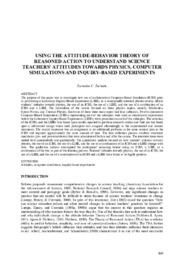| dc.contributor.author | Zacharia, Zacharias C. | en |
| dc.coverage.spatial | CY - Λευκωσία | en |
| dc.creator | Zacharia, Zacharias C. | en |
| dc.date.accessioned | 2016-02-22T07:00:14Z | |
| dc.date.available | 2016-02-22T07:00:14Z | |
| dc.date.issued | 2003 | |
| dc.identifier.uri | http://hdl.handle.net/10797/14749 | en |
| dc.description | Περιέχει το πλήρες κείμενο | el |
| dc.description.abstract | The purpose of this paper was to investigate how use of an Interactive Computer-Based Simulation (ICBS) prior to performing a Laboratory Inquiry-Based Experiment (LIBE), in a conceptually oriented physics course, affects students’ attitudes towards physics, the use of an ICBS, the use of a LIBE, and the use of a combination of an ICBS and a LIBE. The curriculum of the course focused on three physics topics, namely, Mechanics, Optics/Waves, and Thermal Physics. Each one of these three main topics had four subtopics. Twelve Interactive Computer-Based Simulations (ICBSs) representing each of the subtopics were used as introductory experiences before the Laboratory Inquiry-Based Experiments (LIBEs) were presented on each of the subtopics. The selection of the ICBSs and the LIBEs was based upon results reported in previous research studies and their use was based upon a self-control design where each participant was assigned alternatingly to the experimental and control
treatments. The control treatment was an assignment to do additional problems in the same content area as the ICBS and required approximately the same amount of time. The data collection process involved structured interviews (pre- and post-interviews) that were administered before and after the course. The interview items were treated both quantitatively and qualitatively. The quantitative analysis focused on how students’ attitudes towards physics, the use of an ICBS, the use of a LIBE, and the use of a combination of an ICBS and a LIBE change with time. The qualitative analysis investigated the participants’ reasoning behind using an ICBS, a LIBE, or a combination of the two as part of the learning process. Students’ attitudes towards physics, the use of an ICBS, the use of a LIBE, and the use of a combination of an ICBS and a LIBE were found to be highly positive. | en |
| dc.language.iso | eng | en |
| dc.publisher | Department of Educational Sciences, University of Cyprus | en |
| dc.relation.ispartof | Learning and teaching | en |
| dc.rights | info:eu-repo/semantics/openAccess | en |
| dc.rights | Open Access | en |
| dc.source | CBLIS Conference Proceedings 2003 Volume I: New Technologies and their applications in education | en |
| dc.title | Using the attitude-behavior theory of Reasoned action to understand science teachers' attitudes towards physics, computer simulations and inquiry-based experiments | en |
| dc.type | info:eu-repo/semantics/conferenceObject | en |
| dc.subject.uncontrolledterm | Attitudes | en |
| dc.subject.uncontrolledterm | Computer simulations | en |
| dc.subject.uncontrolledterm | Inquiry-based experiments | en |
| dc.contributor.conferenceorganizer | Learning in Physics Group, University of Cyprus | en |
| dc.contributor.coordinator | Constantinou, Constantinos P. | en |
